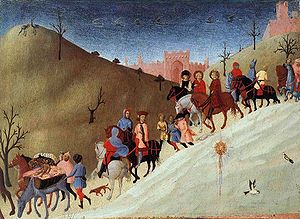- Matthew 2:12
-
Matthew 2:12 is the twelfth verse of the second chapter of the Gospel of Matthew in the New Testament. The magi, dispatched by King Herod, have found and paid homage to the Infant Jesus. In this verse this they return home rather than to Herod.
In the King James Version of the Bible the text reads:
- And being warned of God in a
- dream that they should not
- return to Herod, they departed
- into their own country another way.
The World English Bible translates the passage as:
- Being warned in a dream
- that they shouldn't return
- to Herod, they went back to
- their own country another way.
For a collection of other versions see BibRef Matthew 2:12
That the Magi had no idea of Herod's malicious intentions, despite his reputation and the threat posed by a new king, is to Keener a sign of their innocent naivete and further contrast with Herod's malevolence.[1]
Unlike in Matthew 1, no source of the dream is mentioned, but it likely meant to have come from the same angelic source as Joseph's dreams. In addition to astronomy, Magi were also well known as interpreters of dreams.[2]
Returning a different way has often been seen as a metaphor for the effect finding Christ has on a person's life. Clarke notes that Gregory the Great commented that "having come to know Jesus we are forbidden to return by the way we came."[3] F. Dale Bruner notes that the word way often has theological overtones in Matthew and that a reference to verses such as Matthew 7:13 and 7:14 that discuss the way of salvation might be implied.[4]
At this point the magi leave the narrative and do not reappear. There are many traditional stories about what happened to them after this. One has them baptized by St. Thomas on his way to India. Another has their remains found by Saint Helena and brought to Constantinople. From there they eventually made their way to Germany and the Shrine of the Three Kings at Cologne Cathedral now reportedly holds their remains. Marco Polo in his writings claimed that he saw the perfectly preserved bodies of the three men in Saveh in Persia on his journeys.
Bruner notes that in this verse Matthew refers to just Herod not King Herod as earlier in the chapter. Herod is never again referred to as king in the chapter. Bruner speculates that the worship of the infant by the Magi had altered things and Herod had been supplanted as the true king.[5]
For a discussion of what country they might be returning to see Matthew 2:2.
References
- ^ Craig S. Keener. A commentary on the Gospel of Matthew. Wm. B. Eerdmans Publishing, 1999. pg. 101
- ^ France, R.T. The Gospel According to Matthew: an Introduction and Commentary. Leicester: Inter-Varsity, 1985. pg. 75
- ^ Clarke, Howard W. The Gospel of Matthew and its Readers: A Historical Introduction to the First Gospel. Bloomington: Indiana University Press, 2003.
- ^ Bruner, Frederick Dale. Matthew a Commentary: The Christbook, Matthew 1-12 Wm. B. Eerdmans Publishing, 2004 pg. 64
- ^ Bruner, Frederick Dale. Matthew a Commentary: The Christbook, Matthew 1-12 Wm. B. Eerdmans Publishing, 2004
- Albright, W.F. and C.S. Mann. "Matthew." The Anchor Bible Series. New York: Doubleday & Company, 1971.
- Brown, Raymond E. The Birth of the Messiah: A Commentary on the Infancy Narratives in Matthew and Luke. London: G. Chapman, 1977.
Gospel of Matthew Preceded by:
Matthew 2:11Chapter 2 Followed by:
Matthew 2:13Categories:- Gospel of Matthew verses
- Biblical Magi
Wikimedia Foundation. 2010.

